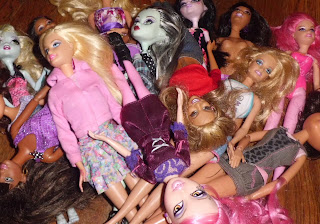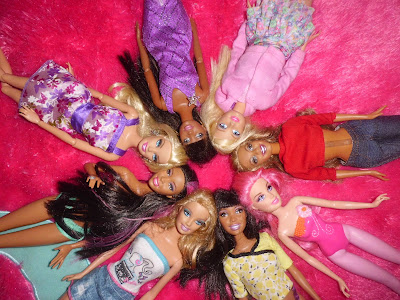There was a recent news story about a mother who purchased a plastic surgery voucher for her 7 year old daughter as a Christmas stocking stuffer. The British mother runs a swinger’s club with her husband and is nicknamed “The Human Barbie” due to her extreme body augmentations that give her the appearance of a life size Barbie doll. The daughter looks up to her mom and wants to be just like her, just the same as most little girls with loving mommies. The mother loves the daughter and wants to give her anything she wants- including liposuction, breast implants, and nose jobs. Is there something wrong with this picture? On one hand it is a loving mother-daughter relationship. On the other it is bizarre.
I read a study about the effects of Barbie dolls on a young child’s body image. It says that Barbie is the best-selling fashion doll in every major global market, with worldwide annual sales of about 1.5 billion. The average 3-10 year old in the United States owns an average of 8 Barbie dolls, and every half a second a Barbie doll is sold somewhere in the world. It also states that Barbie has unrealistic proportions, and if she were a real human she would be so thin she would not be able to menstruate,(Dittmar, Halliwell&Ive, p. 283).
Some parents and professionals blame the toy for psychological disorders such as body dysmorphia, anorexia/bulimia, depression and even as the cause of suicide. However, I tend to question if we can blame these things on a small plastic doll with no voice of her own to influence the children who play with her.
This is not to diminish the reality of such difficult personal obstacles. I understand they are very real. It’s just for me there is a disconnect between a child playing with this toy and developing self-esteem related issues. I don’t think there is a direct one-to-one correlation between the two. Instead, there are a whole slew of other cultural messages perpetuated by media, and society at large that maaaaybe Barbie has become a symbol of. Yet, as parents I strongly believe it is our responsibility- not Barbie’s- to teach our children about body image and societal messages. My main concern is that parents who place blame on the doll itself are grossly underestimating the power of their own influence over their children’s thinking. Eliminating the Barbie doll from your child’s toybox does not resolve the larger problem. Teaching your children to think for themselves does.
 I am going to testify that I was a child who owned an extensive Barbie collection. As I have mentioned, I am bi-racial and I am pretty sure that the vast majority of my Barbie dolls were white, blonde and blue eyed even. I played with the 1980’s Barbie. Before Mattel attempted to change Barbie in order to make her more realistic in her proportions or more ethnic in her appearance. I played with the unrealistic white Barbies more than any other toy, and I can honestly say that it never once crossed my mind that I needed to look like her. Did I want a devoted boyfriend like Ken? Yes. Did I want a pink Corvette? Yes! A girlie townhouse? Definitely! The wardrobe? Absolutely! But the plastic body, hair, eyes and permanent smile, I never imagined could be real, or mine.
I am going to testify that I was a child who owned an extensive Barbie collection. As I have mentioned, I am bi-racial and I am pretty sure that the vast majority of my Barbie dolls were white, blonde and blue eyed even. I played with the 1980’s Barbie. Before Mattel attempted to change Barbie in order to make her more realistic in her proportions or more ethnic in her appearance. I played with the unrealistic white Barbies more than any other toy, and I can honestly say that it never once crossed my mind that I needed to look like her. Did I want a devoted boyfriend like Ken? Yes. Did I want a pink Corvette? Yes! A girlie townhouse? Definitely! The wardrobe? Absolutely! But the plastic body, hair, eyes and permanent smile, I never imagined could be real, or mine. Conversely, I can certainly say that I received direct messages from teen magazines that lighter, clearer skin was preferable, that long silky hair was better, and that big boobs were hot! MTV, BET (Black Entertainment Television), and most movies, TV shows and advertisements confirmed these messages. Once I started caring what boys thought of me, they had already been programmed to prefer the media standard. However, not once did I have a boy tell me that he was not attracted to me because I did not look like Barbie. My hair was frizzy and shoulder length. I had braces, and less than an A cup breast size all through high school. But just like everyone else, I had some good features too: a pretty eye color and a decent derriere for starters.
So, with that being said, I guess what I am trying to get at here is why blame the Barbie when the problem is not actually Barbie!? Playing with the doll alone does not entice children to want to be like the doll. It is really the amount of un-filtered media influence parents allow to penetrate their child’s brain. This is the same argument that guns and video games are to blame for the world’s crime rates. Yet to look at it from a historical perspective, kids have been playing with guns and dolls since time immemorial. In Victorian times there were those awful corsets. That was before Barbie, so who decided that was the cool thing to do?Around the world, little girls have been made to alter their bodies in grotesque and often brutal ways (think female circumcision and foot binding). Though no ancient Barbie dolls have been uncovered in any Chinese archeological dig that I know of. The Roman empire gave us the bloody gladiators. And what about Hitler, Napoleon Bonaparte and Genghis Khan? They didn’t play Modern Warfare 3, but they sure did reek some havoc on the world in their times. Clearly society will find a way to influence minds with or without the toys.
 |
| So come on, can we really blame it all on Barbie? |
I don’t believe in sheltering kids from the world around them. After all, didn’t we decide we wanted to bring these children into this world, as is? Of course we all believed we would change the world, or save it before our children grew up; and we all hoped that they would have a better world to live in than we did. Well, in some ways it is better. In other ways it is worse. The reality is we cannot hide them from reality. But we can educate! As parents we are given carte blanche over our children’s brain development starting from day one. Slowly, we lose influence. However, the seeds you plant when they are small and malleable will grow into beautiful trees of wisdom if you continue to water them with your parental guidance.
As for my daughters, they have Barbie dolls a-plenty. Also, Bratz, Monster High, Liv, Cabbage Patch and whatever… They also take modeling classes, and really love fashion. Maybe they fit the American standard of beauty, maybe they don’t. But you can’t tell them they are not the smartest, most talented and gorgeous little girls on the planet! Ask them if they want to look like Barbie, they will say no! Barbie has a weird smile and fake eyelashes, plus her hair smells funny and always gets messed up. They’d tell you that they would rather look like a real life diva who resembles them more closely such as Beyonce, Rihanna, Willow Smith or even (gasp!) me. They understand that Nicky Minaj has had plastic surgery and that she is an entertainer. They know that most people do not walk around with pink hair or outrageous outfits like Lady Gaga. They also understand that makeup, hair extensions, push-up bras and nose jobs do not make one a better person.They aspire to become successful women who are intelligent and healthy.
Barbie mom articles:
Work Cited:
Dittmar, H., Halliwell, E. & Ive, S. 2006. Does Barbie make girls want to be thin? The effect of experimental exposure to images of dolls on the body image of 5-8 year old girls. Developmental Psychology. Vol. 42 (2). pp 283-292.




No comments:
Post a Comment